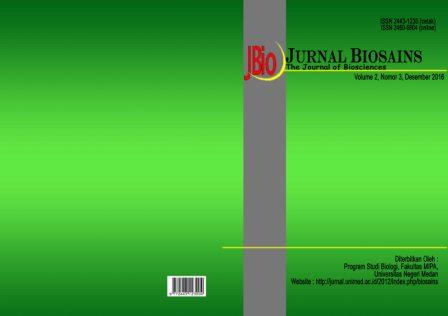PERTUMBUHAN MARKISA DATARAN RENDAH ( Passiflora edulis var.flavicarpa) DENGAN APLIKASI Glomus sp dan Acaulospora sp
DOI:
https://doi.org/10.24114/jbio.v2i3.4956Abstract
Percobaan ini dilakukan di Tanjungsari dan Laboratorium Agrotehnologi Fakultas Pertanian, Universitas Medan Area.Penelitian ini bertujuan mengetahui pengaruh aplikasi inokulant mikoriza terhadap efektifitas simbiosis tanaman markisa dataran rendah dengan Glomus sp + Acaulospora sp dan pertumbuhan tanaman markisa (perkecambahan, tinggi tanaman, jumlah daun, berat basah dan berat kering). Rancangan yang digunakan adalah Rancangan Acak Kelompok dengan faktor perlakuan dosis FMA (A) dengan 4 taraf dan 3 ulangan yaitu :A0 = tanpa inokulasi; A1= 25 g per seed bed ;A2= 50 g per seed bed dan A3=75 g per seed bed. Parameter pengamatan : efektifitas simbiosis, kolonisasi FMA (persentase`dan intensitas kolonisasi), pertumbuhan tanaman (persentase perkecambahan benih, tinggi, jumlah daun, berat basah dan berat kering).Hasil percobaan menunjukkan bahwa tanaman markisa dataran rendah memiliki tingkat ketergantungan yang tinggi terhadap Glomus sp + Acaulospora sp dengan nilai 65.44% - 73.84%. Aplikasi FMA dapat meningkatkan perkecambahan benih di pesemaian dan meningkatkan pertumbuhan bibit markisa. Kata Kunci: markisa dataran rendah, Glomus sp + Acaulospora sp, efektifitas simbiosis, kolonisasi mikorizaDownloads
Published
Issue
Section
License
For Authors Jurnal Biosains agree to the following terms:
Authors retain copyright and grant the Jurnal Biosains (JBIO) right of first publication with the work simultaneously licensed under a Creative Commons Attribution License (CC BY-SA 4.0) that allows others to share (copy and redistribute the material in any medium or format) and adapt (remix, transform, and build upon the material) the work for any purpose, even commercially with an acknowledgement of the work's authorship and initial publication in JBIO (Jurnal Biosains)
Authors are able to enter into separate, additional contractual arrangements for the non-exclusive distribution of the journal's published version of the work (e.g., post it to an institutional repository or publish it in a book), with an acknowledgement of its initial publication in JBIO (Jurnal Biosains)
Authors are permitted and encouraged to post their work online (e.g., in institutional repositories or on their website) prior to and during the submission process, as it can lead to productive exchanges, as well as earlier and greater citation of published work (See The Effect of Open Access).


